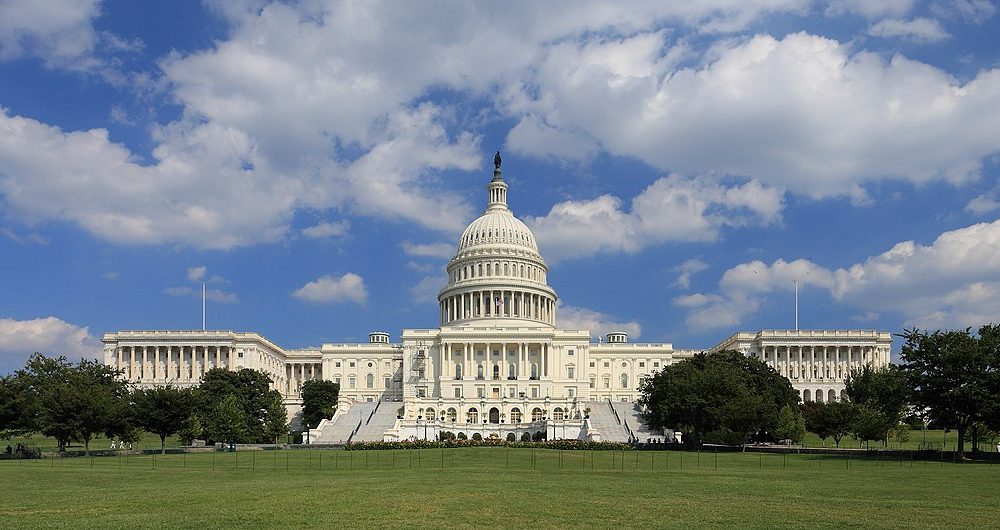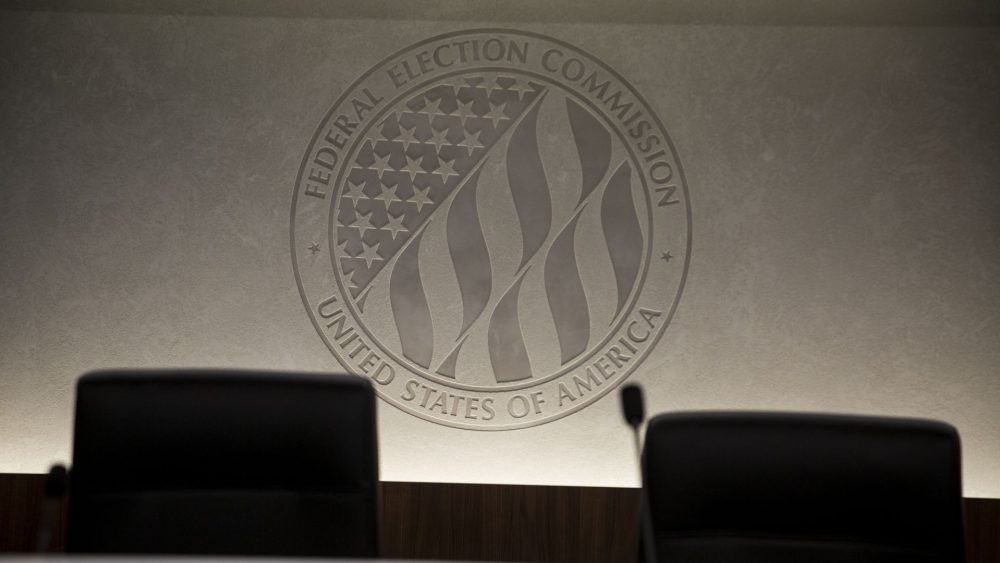November 4, 2021 •
Alaska Releases Prospective Contribution Limits

Alaska State Capitol Buildling - Jay Galvin
Members of the Alaska Public Offices Commission (APOC) have released an advisory opinion, proposing new limits on contributions to political campaigns. Under the new restrictions, an individual would be limited to $1,500 in donations per candidate or group per year […]
Members of the Alaska Public Offices Commission (APOC) have released an advisory opinion, proposing new limits on contributions to political campaigns.
Under the new restrictions, an individual would be limited to $1,500 in donations per candidate or group per year and groups would be limited to $3,000 in donations per candidate or group per year.
After Thompson v. Hebdon found Alaska’s limitations on contributions made by individuals and groups unconstitutional, the APOC adjusted the limits set in 2003 for inflation.
These new limits follow the Supreme Court’s guidance for contribution limits and fall in line with the limits that have been upheld in other states.
The new limits are subject to approval of the five-member commission, scheduled to meet in January.
May 26, 2021 •
U.S. Senate Bill Introduced Following FEC’s Recommendation to Prohibit Unintentional Recurring Contributions

US Capitol - by Martin Falbisoner via Wikimedia Commons
On May 24, a bill was introduced in the U.S. Senate to prohibit political campaigns from using tactics that unwittingly enter donors into recurring contributions. The legislation, Senate Bill 1786, was created in response to a unanimous Federal Election Commission […]
On May 24, a bill was introduced in the U.S. Senate to prohibit political campaigns from using tactics that unwittingly enter donors into recurring contributions. The legislation, Senate Bill 1786, was created in response to a unanimous Federal Election Commission (FEC) legislative recommendation sent to Congress earlier this month.
Titled the “Rescuing Every Contributor from Unwanted Recurrences” (RECUR) Act, the bill amends the Federal Election Campaign Act of 1971 to ban political campaigns from using pre-checked recurring donation boxes, to create a new opt-in requirement for contributors to affirmatively consent to recurring charges, and to require political committees or campaigns to inform contributors about how to cancel recurring contributions and to cancel recurring contributions immediately upon request.
May 6, 2021 •
FEC Recommendations to Congress Include a Request to Prohibit Unintentional Recurring Contributions

FEC; Photo: Sarah Silbiger/CQ Roll Call
On May 6, a unanimous Federal Election Commission (FEC) sent a message to the U.S. Congress: prohibit political campaigns from using tactics that unwittingly enter donors into recurring contributions. As part of a package of legislative recommendations approved at its […]
On May 6, a unanimous Federal Election Commission (FEC) sent a message to the U.S. Congress: prohibit political campaigns from using tactics that unwittingly enter donors into recurring contributions.
As part of a package of legislative recommendations approved at its open meeting, the bipartisan commission asked Congress to amend current federal campaign finance law to require “affirmative consent” by donors if a political entity wants the donors enrolled in a program of recurring contributions.
As reported by the New York Times last month, campaigns involved with former President Donald J. Trump steered large numbers of their political contributors, without the contributors’ realization, into repeated periodic donations though prechecked boxes (for authorization) included on what many donors thought was a one-time payment form. The tactic has also been used by groups supporting Democratic candidates, including Actblue and the Democratic Congressional Campaign Committee.
In its legislative recommendation, the FEC stated “that many contributors are unaware of the ‘pre- checked’ boxes and are surprised by the already completed transactions appearing on account statements.”
April 1, 2021 •
US Supreme Court: Facebook Did Not Violate TCPA

US Capitol - by Martin Falbisoner via Wikimedia Commons
On April 1, the United States Supreme Court unanimously decided automatic text messages sent to telephone numbers culled from a database of a sender, in this case from Facebook, and not from a system having the capacity either to store […]
On April 1, the United States Supreme Court unanimously decided automatic text messages sent to telephone numbers culled from a database of a sender, in this case from Facebook, and not from a system having the capacity either to store or to produce a telephone number using a random or sequential number generator, is not prohibited under The Telephone Consumer Protection Act of 1991 (TCPA).
While this decision does not apply to robocalls, it does seem to permit those in political campaigns to allow voice calls and text messages, taken from their databases, to be automatically made from technology not using a random or sequential number generator without fear of violating the TCPA.
In Facebook, Inc. v. Duguid, Noah Duguid, who had never created a Facebook account, continually received text messages from Facebook. Duguid alleged that Facebook violated the TCPA by maintaining a database storing phone numbers and sending automated text messages from that database. In a 9-0 decision, the court agreed with Facebook’s technical argument that the TCPA does not apply because the technology it used to text Duguid did not use a “random or sequential number generator.”
The TCPA was enacted to prevent the abuse of telemarketing made with an “automatic telephone dialing system” and other troublesome tactics.
November 5, 2012 •
Social Media and Political Campaigns in the News
in honor of the upcoming election…
 “5 social media questions 2012 will answer” by Steve Friess in Politico.
“5 social media questions 2012 will answer” by Steve Friess in Politico.
“Tweet, like, and vote: Social media in modern campaigns” by Rachel Sadon and Leah Yarnshon in TechHive.
“The Politics Of Social Media” by Krister Rollins in WCSH News.
“Social Technologies Changing How the Next Generation Votes (Infographic)” by Crystal Hutter in the Huffington Post.
October 24, 2012 •
Our Wednesday Government Relations News
Don’t miss the articles you need to keep up with the latest news about lobbying, campaign finance, and elections:
 Lobbying
Lobbying
“K Street flags shortcomings of lobbying law” by Dave Levinthal in Politico.
“Lobbying spending goes up even with Congress away” by Dave Levinthal in Politico.
“K Street prepares for sequestration battle” by Kevin Bogardus in The Hill.
“Facebook continues record lobbying spending” by Jennifer Martinez in The Hill.
“Lobbying Groups Object to Proposed NY Ethics Regulations” by Chris Vest in Associations Now.
“Romney and the lobbysists” by Heath Brown in The Hill.
Campaign Finance
“Citizens United: What Obama, Romney would do about campaign finance reform” by Justin Elliott in the Alaska Dispatch.
“Mauled by Ads, Incumbents Look to Declaw Outside Groups” by Jennifer Steinhauer in The New York Times.
Campaigns and Elections
“Why Are Elections On Tuesdays?” by Selena Simmons-Duffin on NPR.
“Why Campaigns Are Happy Your Vote Isn’t as Private as Many Think It Is” by Nick Judd in TechPresident.
Tech and Social Media
“Federal website satisfaction dips slightly” by Joseph Marks in Nextgov.
September 26, 2012 •
Wednesday Government Relations News
Don’t miss the articles you need to keep up with the latest news about lobbying, campaign finance, and ethics:
Lobbying
“K Street Follows Lawmakers Outside the Beltway ” by Kate Ackley and Janie Lorber in Roll Call.
” by Kate Ackley and Janie Lorber in Roll Call.
“Super PACs get new use — as lobbying arms on Hill” by Dave Levinthal in Politico.
“Report: D.C. lobbyist on ‘The Bachelor’” by Patrick Gavin in Politico.
“Federal court tosses out lawsuit challenging Obama’s lobbyist ban” by Kevin Bogardus in The Hill.
“Judge sentences gambling lobbyist Jennifer Pouncy to 3 years probation” by Sebastian Kitchen in the Montgomery Advertiser.
Campaign Finance
“Report ranks corporate political openness” by Dave Levinthal in Politico.
Ethics
“N.J. Democrats ask ethics commission to look into Christie’s use of GOP video at town hall” by Jenna Portnoy in the Star-Ledger.
Elections and Political Campaigns
“Secretaries of State Still Juggling Politics, Elections” by Louis Jacobson in Governing.
“New voter laws could delay outcome of close elections as states scrutinize provisional ballots” by The Associated Press in the Washington Post.
“U.S. Supreme Court Lets West Virginia Voting Maps Stand” in Governing.
Social Media
“Cities and Counties Try Facebook for Government” by Hilton Collins in Government Technology.
August 17, 2012 •
Social Media and Political Campaigns in the News
Here is a roundup of the latest articles about how political campaigns are using social media and technology:
 “Announcing techPresident’s ‘Politics and the Internet’ Timeline” by Micah L. Sifry in TechPresident.
“Announcing techPresident’s ‘Politics and the Internet’ Timeline” by Micah L. Sifry in TechPresident.
“How the Presidential Candidates Use the Web and Social Media” in the Pew Research Center’s Journalism.org.
“Fake social media followers newest ploy, accusation in political campaigns” by The Associated Press in The Washington Post.
“‘Pics or it Didn’t Happen’: 5 Ways Politicians Are Using Instagram” by Amanda Le in the Independent Voter Network.
“Politic365 Launches #VoiceYourVote” on Politic365 Blog.
July 11, 2012 •
Political Campaigns and Social Media
Social media is playing a high profile role in the 2012 political campaigns and these articles seek to make sense of the latest trends:
“CNN, Facebook Partner to Make ‘America’s Choice 2012’ Political Coverage an Interactive, Social Experience” on CNN News.
“Facebook Wants to Be the ‘Second Screen’ of Election 2012 Coverage” by Zoe Fox in Mashable.
“Facebook will be a key part of the 2012 election” in the Capitol Column.
“Social Fundraising Platform Rally To Launch One-Click Donations” by Sarah Lai Stirland in TechPresident.
Also, be sure to take a look at:
“A Politician’s Guide to Social Media (VIDEO)” in Government Technology.
Video courtesy of Govgirlblog on YouTube.
June 29, 2012 •
Government and Campaigns Technology News Update
We are always following news about the interplay between government, political campaigns, social media, and technology:
 “David All Shares Ideas on Emerging Trends for Campaigns and Elections” by Matt Williams and Matt Pittman in Government Technology.
“David All Shares Ideas on Emerging Trends for Campaigns and Elections” by Matt Williams and Matt Pittman in Government Technology.
“Apps Challenge Aims to Improve Detroit Through Technology” by Brian Peteritas in Governing.
“How 3 Startups Are Improving Urban Life Through Tech” by Jennifer Diamond in Mashable.
“States, Cities Use Social Networks to Test Open Records Laws and Transparency Goals” by Dylan Scott in Governing.
“Reps. Delete Tweets Celebrating Overturning of Affordable Care Act” by Sarah Lai Stirland in TechPresident.
“Heavy Twitter Traffic for Scotus Ruling” by Rubina Madan Fillion and Brian Aguilar in The Wall Street Journal.
October 21, 2011 •
The Power of Data in Political Campaigns
The power of micro-targeting
 Yesterday, techPresident published “New Obama for America Page is a Jungle Gym for Donation Data” by Nick Judd.
Yesterday, techPresident published “New Obama for America Page is a Jungle Gym for Donation Data” by Nick Judd.
Everyone has been talking about the new role social media is playing in the 2012 presidential campaigns. But I think Judd brings up an often missed point: The importance of social media’s role is not so much to be found in the social networks themselves, but in the vast amount of information the campaigns have about each of us, and how they are using that information on social media. Judd writes about campaigns “micro-targeting” potential political campaign donors with personalized messages geared toward attracting the most money.
The article showcases the Obama 2012 campaign website, which boasts its one million donors. The site allows you to drill down into a great deal of information about the contributions. The aim of the site is that the visitor will come to the conclusion that the donors are broad-based and grassroots.
Have any of our readers seen any similar examples on other campaign websites? Please share it on Lobby Comply!
State and Federal Communications, Inc. provides research and consulting services for government relations professionals on lobbying laws, procurement lobbying laws, political contribution laws in the United States and Canada. Learn more by visiting stateandfed.com.

